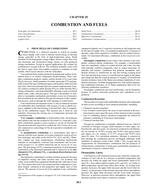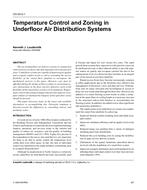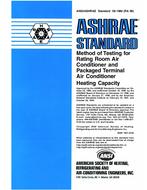Seven thermal bridges occurring in a large modern office building are identified. The impact that these bridges have on building envelope heat flow and minimum interior surface temperature is investigated using a finite-difference heat transfer computer program. Assumptions that are made in the development of two- and three-dimensional numerical models are discussed. Steadystate numerical models are employed to determine parameters that can be used to calculate corrections to the values for heat flow and interior surface temperature obtained from one-dimensional analyses. The need for a means of characterizing the dynamic thermal response of bridges is also discussed, and two different numerical approaches to the calculation of response factors (or conduction transfer functions) are explored.
Units: I-P
Citation: Symposium, ASHRAE Transactions, 1988, vol. 94, pt. 2, Ottawa
Product Details
- Published:
- 1988
- Number of Pages:
- 17
- File Size:
- 1 file , 1.4 MB
- Product Code(s):
- D-OT-88-15-2


